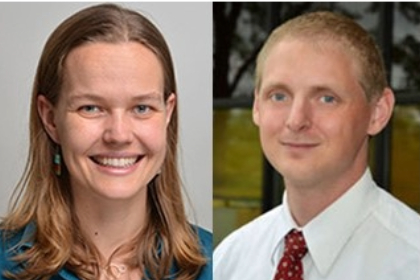(JULY 24, 2024) Catherine Naden, M.D.’11, clinical assistant professor of family medicine, and Justin Stinnett-Donnelly, M.D.’10, M.S., clinical assistant professor of medicine, were quoted in a Vermont Public story on the use of an artificial intelligence (AI) tool to reduce burnout.

Catherine Naden, M.D.’11, clinical assistant professor of family medicine (left), and Justin Stinnett-Donnelly, M.D.’10, M.S., clinical assistant professor of medicine
(JULY 24, 2024) Catherine Naden, M.D.’11, clinical assistant professor of family medicine, and Justin Stinnett-Donnelly, M.D.’10, M.S., clinical assistant professor of medicine, were quoted in a Vermont Public story on the use of an artificial intelligence (AI) tool to reduce burnout in primary care doctors.
The University of Vermont Health Network is offering an AI software called Abridge to all of its primary care doctors. The software helps with writing notes, a time-intensive process that takes hours each day and can lead to burnout.
“It transformed the practice for me overnight,” said Naden, a primary care and sports medicine doctor in Waterbury. “And I don’t really like technology.” Naden said it’s taken away some of the stress of multitasking during a patient visit. “You’re not sitting there typing away madly as they say everything,” she said. “I found it was very mentally liberating to be able to focus on the patient, what they were saying, and the medical decision making and orders that needed to be entered.”
Stinnett-Donnelly, a hospitalist and technology leader at UVM Health Network who helped oversee the pilot program, said the benefit has been so compelling, it was an easy decision to make.
Based on survey data from the pilot program, without the software, doctors estimated that they spent a total of five hours a day writing notes, both during and after work, for a full day of seeing patients. When using the software, that dropped to two hours a day, according to Stinnett-Donnelly.
“It’s the first time that I have really gotten, in my role as an informaticist, unsolicited emails thanking me and thanking the organization for bringing this to people because it has truly helped them,” he said.
This topic was also covered by WCAX-TV, NBC5, and Healthcare Finance News.
Read full story
at
Vermont Public